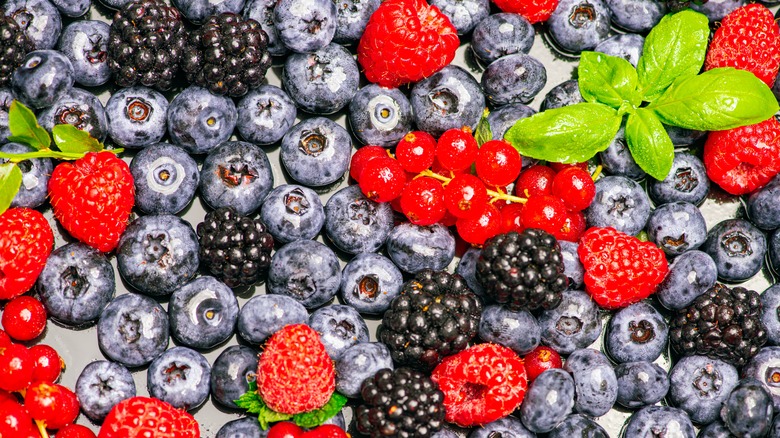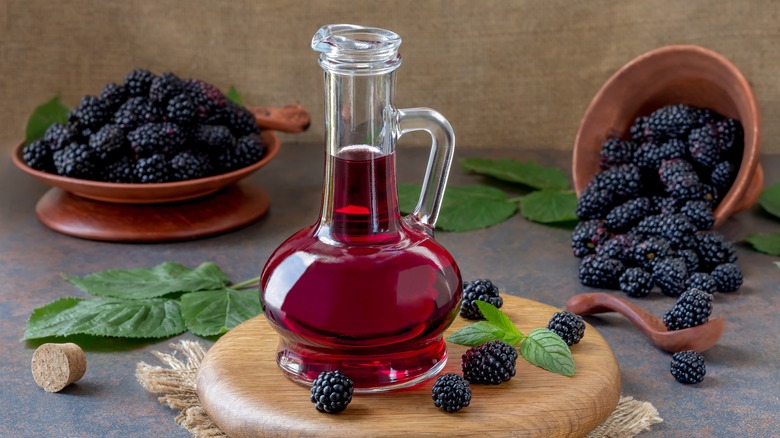The Savory Ingredient You Shouldn't Sleep On For Macerated Berries
Whether you mix them into a cup of yogurt or pop them straight into your mouth and enjoy them like the candied little delights they are, berries are one of Mother Nature's greatest gifts. From the quintessential strawberry to the beloved raspberry and the medicinal elderberry, there are a million and one ways to use these bite-sized fruits, but you'd be remiss to think they always have to be sweet. Macerating is a culinary technique where berries are soaked in a liquid with sugar and any other flavoring agent to soften the berries and intensify their flavors — think of it as a meat marinade for berries. But you don't always have to macerate berries to amplify their sweetness — adding red wine vinegar to the mix will give them a savory edge for heartier recipes.
Introducing red wine vinegar to a berry maceration mixture adds dimension and depth of flavor to the fruits, culminating in a tart, tangy, yet umami-forward flavor profile that complements the natural sweetness of the berries. Berries macerated in a red wine vinegar solution will maintain their brightness and delicate whispers of sweetness without taking on a cloying taste; plus, they pair well with a wide range of foods, ensuring you'll never run out of tasty ways to use them.
Tips for macerating berries with red wine vinegar
Although macerating berries sounds like a technique reserved for experts, it's more accessible than you might think. With a few tips in mind and a couple of tricks up your sleeve, you'll turn those sweet little berries into a savory snack in no time. For starters, the berries you select are ultimately your choice, so pick your favorite variety and don't think twice — there's no wrong answer.
Since red wine vinegar is acidic, it's essential to balance it with sweetness. You can add sugar, honey, or another sweetener of your choice to the maceration mixture — taste as you go and adjust the sweetness to your preference. Be careful not to add too much sweetener as the goal here is to impart the berries with a savory edge. A good ratio guideline is three tablespoons of sugar and two tablespoons of red wine vinegar for every one-and-a-half cup of berries. Including a pinch of salt in the mixture can intensify all of the flavors of the final product.
But how long should you macerate fruit for the best results? The berries can saturate in the mix anywhere from thirty minutes to 24 hours. The longer they sit, the more intense the flavor will be, so consider your intentions for using them before you determine how long you'll soak them. Don't hesitate to include additional flavors like citrus juice and zest, fresh herbs like mint and rosemary, or cinnamon or nutmeg for a warming, spicy twist.
Uses for red wine vinegar macerated berries
Now that you know just how easy macerating berries with red wine vinegar is, you'll need some ideas for using them up. Although they make for a tasty treat on their own, you might be surprised at just how many ways you can use them in hearty, umami-packed recipes.
Serve the macerated berries alongside grilled chicken, pork, or steak where the tangy undertones of the berries pair well with the charred machismo of grilled meats. Add the berries to a well-designed charcuterie board where their tangy, acidic flavors will liven up the heartiness of the board's cured meats and rich cheeses. Use the red wine vinegar-infused berries as a topping for savory tarts or galettes made with goat cheese and caramelized onion for a sophisticated pastry that's equal parts savory and sweet. Don't limit yourself — these savory-sweet delights are also great on summer salads, pizzas, sandwiches, and so much more!
Gone are the days when berries existed only to sweeten up your smoothies. Shake up your fruit routine by macerating your favorite medley of berries in a savory, red wine vinegar.


